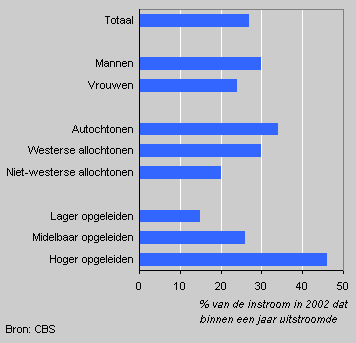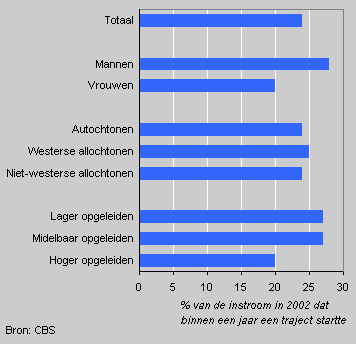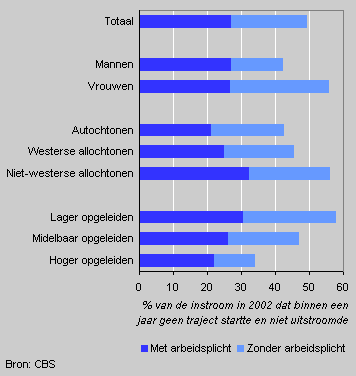One quarter of income support claimants start reintegration process

Twenty-seven percent of all adults who started receiving income support in 2002, were able to end this situation through their own efforts within one year. Nearly one quarter started a reintegration process. The remainder were still receiving income support one year later, without having started any form of reintegration.
The largest inflow into income support is in the big cities. The results described here refer to 53 of the 85 cities with big city problems. Some 50 percent of people starting to claim income support live in these 53 cities. The results do not necessarily reflect the situation in the whole country.
Outflow depends on educational level
Twenty-seven percent of people receiving income support for the first time in 2002 were able to put themselves in a situation where they could to manage without this benefit within one year. Relatively more men than women, and relatively more native Dutch and western foreigners than non-western foreigners stopped receiving income support. Educational level correlates strongly with being able to end income support. The number of higher educated people getting out of this situation is three times as high as the number of people with only primary education.
People who stop claiming income support, 2002

One quarter goes into reintegration
Twenty-four percent of people who started receiving income support in 2002 started a reintegration process within one year. Fewer women than men started such a process, while also fewer of them were able to get out of income support through their own resources. People with lower education, of whom only few managed to get out of this situation on their own, did not enter a reintegration process more often than those with intermediate education. Non-western foreigners were just as likely to enter a reintegration process as native Dutch claimants.
Reintegration of income support claimants, 2002

Half of claimants stay in income support
Forty-nine percent of adult income support claimants who received this benefit for the first time in 2002 did not start a reintegration process and were still receiving the benefit one year later. Nearly half of this group were exempted from the obligation to look for a job because they had to care for a child or were not medically fit to work.
Non-reintegraters who continue to receive income support, 2002

Of the people who were obliged to seek work, slightly more non-western foreigners and lower educated people remained in income support without starting reintegration.
Maartje Rienstra and Mathilda Copinga